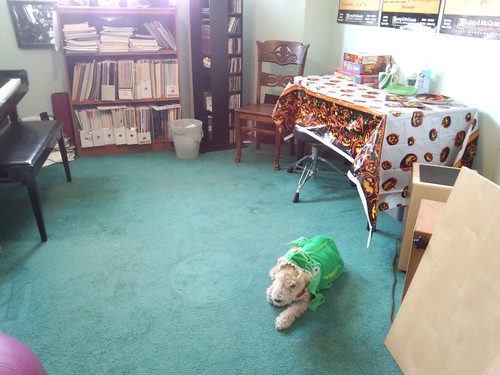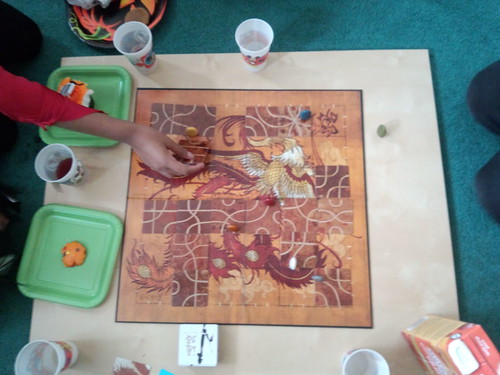Last year, inspired by music educators who host social events and informal performances for their students, I jumped on this creative music teaching idea. I offered three piano parties to my students, which fast became one of the most popular events of the year. Last weekend, I hosted the first one of the 2013/14 year. It was a Halloween Piano Party. All of my students came in costume and brought treats to share. I supplied a meat and cheese tray, juice and games.

The students who arrived first created their own ice breaker. One of the questions was "If you could have a superpower, any super power in the world, what would it be?"
My students and I played one spooky song each. For most of us, we performed one of the pieces I assigned as a Sight-Reading Challenge. They did well.
Me, on the other hand, performed something I hadn't run through for a few days and had to compete with kids and canine assistant who were all excited about the arrival of two more students. It became a case study on playing with distractions.
Then, I introduced my music students to some tabletop games that most had never seen before. On one hand, I was thinking of giving them a break from music games. Later, after reading that my colleague, Diane Hidy often does puzzles with potential students, I realized that I had a golden opportunity to see how my students think.
We started with Labryinth. It's a 3D maze game, in which the players race to find the treasures. Of the four newbies, one caught on very quickly. Another couldn't care less, while the other two had an extremely tough time planning their moves because they couldn't seem to visualize what their next move should be. At least, not without someone (either myself or my other two students who have played the game before) pushing a tile in to show them possible cause and effects. It was a game where my visual, creative thinkers dominated.
The second game was the undisputed favourite: Tsuro. It's a tile-based game in which you try to be the last dragon flying on the board. Each tile contains four lines; four possible paths to follow. All of my students latched onto the concept fairly quickly. The two who struggled with Labyrinth had an easier time because they could fiddle with the tiles and pretend to lay it down to see where the path would lead.

And yes, they started to think ahead, asking themselves: "If I put the tile down like this, what is my dragon's path?" Not all of them. One of them left things to chance.
The third game I introduced them to was King of Tokyo. It's a dice and card game in which monsters take pot shots of each other. The victor is either the first monster to reach 20 victory points, or the last monster standing.
One thing I learned with the games is not to spend too much time with the rules. I gave the kids the objective of the game, general actions and then had them jump in. With King of Tokyo, I explained what their dice rolls gave them, answered the questions about the cards and then let them decide what to do.
One student left King of Tokyo to return to Tsuro, leaving two boys and one girl. My female student was starting to think strategically but her monster was killed off early in the game. She too, returned to Tsuro.
That left the two boys who were looking forward to being monsters to enjoy an epic slugfest to their hearts' content. Neither were thinking of victory points, opting to just continually take pot shots at each other.
In short, I learned three things. First, the visual and creative thinkers were most successful at the games. Second, the ones who thought strategically were also my students who are more detail oriented and third, the one who didn't really care about strategy is also the one who has the most problems with timing. He was also the most enthusiastic about being a monster.
All in all, my music students had a fun time. They all cheered each other on when they performed. They ate a balance of sugar and healthier food and they thoroughly enjoyed themselves with the tabletop games.
I relished in the opportunity to give them a relaxed performance opportunity, another way to see how they think and to share with them some fun games that they could enjoy with their family and friends. The piano party continue to be one creative teaching idea that is worth repeating again and again.
